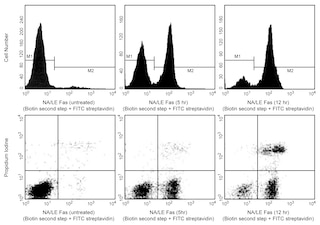Old Browser
This page has been recently translated and is available in French now.
Looks like you're visiting us from {countryName}.
Would you like to stay on the current country site or be switched to your country?


.png)

Two-color analysis of CD55 expression on splenic B lymphocytes. C57BL/6 splenocytes were pre-incubated with Mouse BD Fc Block™ purified anti-mouse CD16/CD32 (Cat. No. 553141/553142), stained with FITC anti-mouse CD45R/B220 (Cat. No. 553087/553088) and either PE Hamster IgG3, λ isotype control (Cat. No. 553980, left panel) or PE Hamster anti-Mouse CD55 (Cat. No. 58037, right panel). Dead cells were excluded by staining with propidium iodide (Cat. No. 556463), and the total viable leukocytes are displayed. The data demonstrates that CD55 is expressed on the majority of splenocytes, with the greatest density on B lymphocytes. Flow cytometry was performed on a BD FACScalibur™ flow cytometry system.
.png)

BD Pharmingen™ PE Hamster anti-Mouse CD55
.png)
Regulatory Status Legend
Any use of products other than the permitted use without the express written authorization of Becton, Dickinson and Company is strictly prohibited.
Preparation And Storage
Product Notices
- Since applications vary, each investigator should titrate the reagent to obtain optimal results.
- An isotype control should be used at the same concentration as the antibody of interest.
- Caution: Sodium azide yields highly toxic hydrazoic acid under acidic conditions. Dilute azide compounds in running water before discarding to avoid accumulation of potentially explosive deposits in plumbing.
- For fluorochrome spectra and suitable instrument settings, please refer to our Multicolor Flow Cytometry web page at www.bdbiosciences.com/colors.
- Although hamster immunoglobulin isotypes have not been well defined, BD Biosciences Pharmingen has grouped Armenian and Syrian hamster IgG monoclonal antibodies according to their reactivity with a panel of mouse anti-hamster IgG mAbs. A table of the hamster IgG groups, Reactivity of Mouse Anti-Hamster Ig mAbs, may be viewed at http://www.bdbiosciences.com/documents/hamster_chart_11x17.pdf.
- Please refer to www.bdbiosciences.com/us/s/resources for technical protocols.
Companion Products





.png?imwidth=320)
The RIKO-5 monoclonal antibody specifically recognizes the membrane-associated complement regulator CD55, also known as decay-accelerating factor (DAF). CD55 is expressed on the surface of erythrocytes and most splenic leukocytes, including B and T lymphocytes and CD11b-positive splenocytes, but it is not detected on thymocytes. Immunohistochemical staining (using a different monoclonal antibody) demonstrates that CD55 is expressed on vascular endothelium and many other cells types in a wide variety of organs. In the mouse, there are two isoforms of CD55, transmembrane and GPI-anchored, that are recognized by the RIKO-5 antibody. Both isoforms are able to protect cells from complement attack by inhibiting the deposition of C3 on antibody-sensitized cells, but the RIKO-5 antibody is not able to neutralize this activity. CD97, a member of the EGF-TM7 family that is widely expressed in mouse tissues, is another ligand for CD55.

Development References (7)
-
Ahmad SR, Lidington EA, Ohta R, et al. Decay-accelerating factor induction by tumour necrosis factor-alpha, through a phosphatidylinositol-3 kinase and protein kinase C-dependent pathway, protects murine vascular endothelial cells against complement deposition. Immunology. 2003, October; 110(2):258-268. (Biology). View Reference
-
Leemans JC, te Velde AA, Florquin S, et al. The epidermal growth factor-seven transmembrane (EGF-TM7) receptor CD97 is required for neutrophil migration and host defense. J Immunol. 2004, January; 172(2):1125-1131. (Biology). View Reference
-
Lin F, Fukuoka Y, Spicer A, et al. Tissue distribution of products of the mouse decay-accelerating factor (DAF) genes. Exploitation of a Daf1 knock-out mouse and site-specific monoclonal antibodies. Immunology. 2001, October; 104(2):215-225. (Biology). View Reference
-
Miwa T, Maldonado MA, Zhou L, et al. (CD55) exacerbates autoimmune disease development in MRL/lpr mice. Am J Pathol. 2002, September ; 161(3):1077-1086. (Biology). View Reference
-
Miwa, T., X. Sun, et al. Characterization of glycosylphosphatidylinositol-anchored decay accelerating factor (GPI-DAF) and transmembrane DAF gene expression in wild-type and GPI-DAF gene knockout mice using polyclonal and monoclonal antibodies with dual or single specificity.. Immunology. 2001; 104:207-214. (Biology). View Reference
-
Ohta R, Imai M, Fukuoka Y, Miwa T, Okada N, Okada H. Characterization of mouse DAF on transfectant cells using monoclonal antibodies which recognize different epitopes. Microbiol Immunol. 1999; 43(11):1045-1056. (Biology). View Reference
-
Yamada K, Miwa T, Liu J, Nangaku M, Song WC. Critical protection from renal ischemia reperfusion injury by CD55 and CD59. J Immunol. 2004, March; 172(6):3869-3875. (Biology: Flow cytometry). View Reference
Please refer to Support Documents for Quality Certificates
Global - Refer to manufacturer's instructions for use and related User Manuals and Technical data sheets before using this products as described
Comparisons, where applicable, are made against older BD Technology, manual methods or are general performance claims. Comparisons are not made against non-BD technologies, unless otherwise noted.
For Research Use Only. Not for use in diagnostic or therapeutic procedures.
Report a Site Issue
This form is intended to help us improve our website experience. For other support, please visit our Contact Us page.